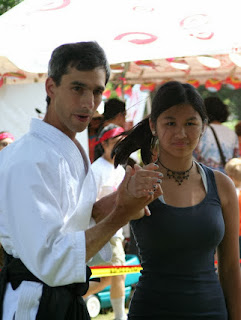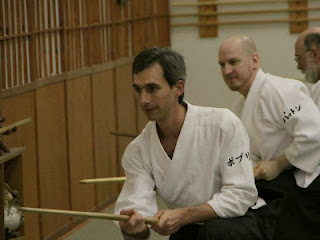 |
| Teaching how to relax without collapsing. |
We are Stronger When We Relax
When we are relaxed and calm, we are
able to perform to the best of our ability. Our efforts naturally
produce movement, momentum, and results. When we are tense and
anxious our performance suffers. Our efforts are absorbed by friction and dissipated as heat. We are often left feeling thwarted or ineffective.
Try this simple exercise: Spread your fingers apart as wide as possible and make your whole hand and forearm as tense as you can. Make it really tight. Now shake your tense hand back and forth as fast as you can. Not very fast is it? Now, relax your hand and forearm completely. Again, shake your hand back and forth as fast as you can. You should be able to shake it much faster.
Click here to Tweet this:
Being able to move our body quickly is a key to performance in elite
athletics and in martial arts. Being able to move our mind quickly is a
key to performance in every area of life. Relaxing allows us to be quick and responsive, open the door to optimal performance. In stressful
situations, however, we may feel
that if we relax we will loose our "edge." To move beyond this, we need to understand the difference between relaxation and collapse.
Relaxation is Different than Collapse
When I run beginning Aikido classes, I always ask the new students what comes to mind when they hear the phrase "relax completely." What comes to mind when you hear that phrase? Most people get an image of collapsing on a sofa or lounging in a hammock--half asleep. This is not the kind of relaxation I mean here. In Ki-Aikido, we refer to this condition as collapse. In this state, we cannot perform at a peak level. Our body, and likely our mind as well, are unprepared for action. |
| Using the wooden sword to practice relaxed attention. |
Actually, the condition of collapse gets in the way of true relaxation. When we collapse, we have a looseness and floppiness about us. When things around us move or change, we are jarred and jolted. The condition of collapse also dulls our awareness and makes it less likely that we will feel changes taking place around us. Since we live in a world that is constantly moving and changing, collapsing ultimately lead to tension and stress--especially if we are out to develop ourselves or broaden our reach in the world.
In an upcoming post, I will examine how we can learn to relax--not just when we are on vacation, but in any situation. The techniques do take practice, but they can be applied anywhere and under any circumstances to help you perform to the best of your ability. Stay tuned!
Resources
Want to learn more from my Ki-Aikido mentors about relaxation? Here are a few links to check out:- Dr. David Shaner, my teacher, Chief Instructor of the Eastern Ki Federation, and author of Seven Arts of Change: Leading Business Transformation that Lasts, discusses the application of "The Art of Relaxation" to business change initiatives. [watch the video]
- Shinichi Tohei Sensei, President of the International Ki-Aikido Society, writes about the true meaning of "Calming the Mind." [read the blog]
- Christopher Curtis Sensei, Chief Instructor of the Hawaiian Ki Federation, hosts a discussion on the principle of relaxation in Ki-Aikido training. [download the transcript of the mp3 audio].
No comments:
Post a Comment